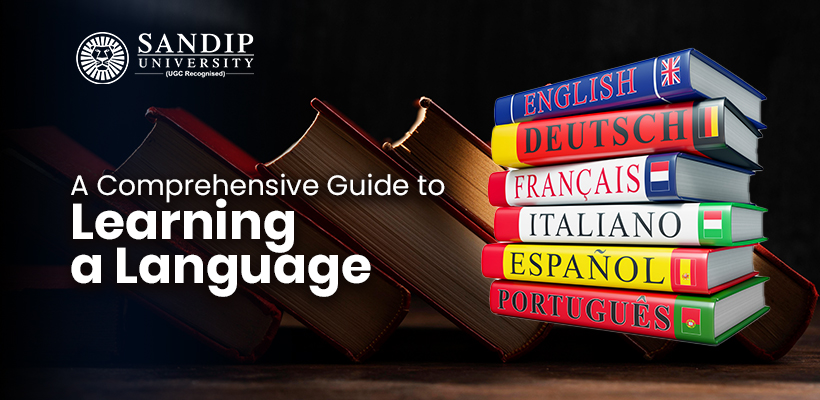Learning a new language is an enriching experience that opens doors to new cultures, people, and opportunities. Whether you are enhancing your career prospects, communicating with locals while traveling, or simply broadening your horizons, the journey of language acquisition holds immense value. Many top engineering colleges in Maharashtra include foreign languages in their course curriculum to help students build global careers.
In this blog, we will explore effective strategies and resources to help you embark on your language learning journey with confidence.
The Process of Language Learning
Before discussing language learning techniques and tools, it is crucial to understand the learning process itself. Language acquisition involves four primary skills: listening, speaking, reading, and writing. Each skill requires different approaches and practice methods. Additionally, you must understand your learning style—whether you are a visual, auditory, or kinaesthetic learner. It can help tailor your study plan for getting a positive and productive outcome.
Strategies for Effective Language Learning
- Set Clear Goals: First think of the reasons for learning a new language and set achievable short-term and long-term goals. Whether it is achieving conversational fluency or passing a proficiency exam, clear objectives will keep you motivated and focused.
- Immerse Yourself: Surround yourself with the language as much as possible. Listen to music, watch movies or TV shows, and read books or articles in your target language. Immersion accelerates learning by exposing you to authentic language use and cultural aspects.
- Regular Practice: Regular practice is key to get mastery over language. Spare some time each day to study and strengthen your skills through formal lessons, conversation practice, or self-study exercises.
- Utilise Technology: Many language learning apps are available easily, which offer interactive and convenient ways to practice vocabulary, grammar, and pronunciation.
Popular Language Learning Apps
Duolingo: The basic features of Duolingo are completely free, though they also offer a premium subscription. It is known for its gamified approach. Duolingo offers lessons in over 40 languages. Users complete the exercises to practice vocabulary, grammar, and listening skills.
Rosetta Stone: This app focuses on teaching languages intuitively, without translations, by using images and associating them with words. This immersive language learning platform uses a natural method that emphasises visual and auditory learning. It also offers courses in numerous languages and focuses on building conversational proficiency.
Babbel: Like Rosetta Stone, Babbel prioritises getting you comfortable real-life conversations. Its lessons are designed to be practical and applicable to everyday situations. It provides personalised language courses tailored to learners’ needs and proficiency levels. Its structured lessons cover vocabulary, grammar, and cultural insights.
Memrise: This app uses flashcards to teach vocabulary and grammar, but with a twist. It incorporates spaced repetition, a scientifically proven method that shows you terms at optimised intervals to enhance memorisation. Memrise utilises spaced repetition and reminder techniques to help users memorise vocabulary effectively. Courses are created by the community and cover a wide range of languages.
HelloTalk: This language exchange app connects users with native speakers around the world for language practice through text, voice, and video chat. HelloTalk facilitates real-time conversations and cultural exchange.
Anki: Anki is a flashcard app that uses spaced repetition to help users memorise vocabulary, phrases, and grammar rules. Users can create their own flashcard decks or download pre-made decks shared by others.
Supplementing Apps with Other Resources
While language learning apps offer valuable practice and reinforcement, they should be complemented with other resources for a well-rounded learning experience:
- Textbooks and Workbooks: such kinds of traditional language learning materials provide structured lessons, explanations, and exercises to reinforce grammar and vocabulary.
- Tutors or Language Exchange Partners: Practising with a tutor or language exchange partner allows for personalised feedback, conversation practice, and cultural insights.
- Language Courses: there are some formal language courses, whether in-person or online, offer structured instruction and opportunities for interaction with instructors and classmates.
- Media and Authentic Materials: Engaging yourself in authentic language materials such as books, newspapers, podcasts, and films enhances comprehension and exposes you to real-world language use.
Developing Language Skills
To effectively develop each language skill, incorporate diverse practice methods into your study routine:
Listening: Listen to podcasts, audiobooks, and native speakers to improve listening comprehension and pronunciation.
Speaking: Practice speaking regularly through conversation practice with tutors or language exchange partners, or by recording yourself and comparing your speech to native speakers.
Reading: Read books, articles, and news in your target language to expand vocabulary and improve reading comprehension.
Writing: Keep a language journal, write essays, or participate in online forums to practice writing skills and receive feedback from native speakers.
Overcoming Challenges and Staying Motivated
Language learning is not without its challenges, but persistence and dedication yield rewarding results. Here are some strategies to overcome common obstacles and maintain motivation:
Consistency: Establish a study routine and stick to it, even on days when motivation is low.
Celebrate Progress: Recognise and celebrate small achievements along the way to stay motivated and track your progress.
Stay Flexible: Adjust your study methods and goals as needed based on your progress and changing priorities.
Find Support: Join language learning communities, forums, or social media groups to connect with fellow learners for support, encouragement, and advice.
Conclusion
By understanding the language learning process, setting clear goals, utilising effective strategies and resources, and staying motivated, you can make significant progress in mastering a new language. Whether you are learning for personal, professional, or academic reasons, the skills and experiences gained through language acquisition are invaluable and enduring.
Language learning apps offer convenient and interactive ways to practice vocabulary, grammar, and pronunciation. Combined with other resources such as textbooks, tutors, and authentic materials, they form a comprehensive approach to language acquisition. With dedication, perseverance, and a positive mindset, you can open the doors to a world of new opportunities through language learning.

